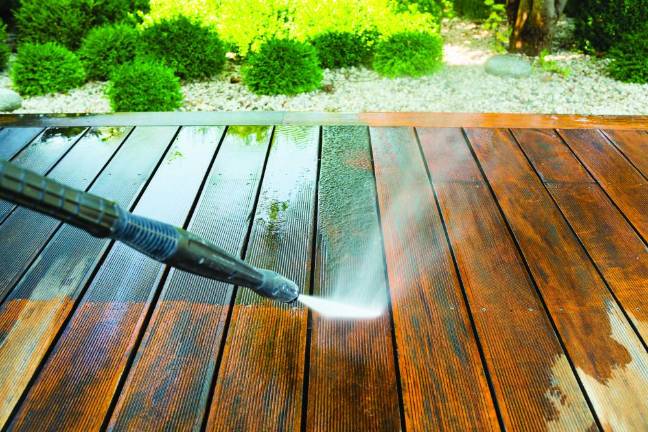Power Washing 101
Outdoor cleaning. Build-up throughout the winter can leave our windows, doors and home exteriors covered in unsightly muck.

Power washing can leave it all looking as good as new. But don’t stop there: This powerful tool is also great at bringing a host of other things to life in your home and garden, including driveways, grills, outdoor furniture, decks, fences and walkways. Just keep important safety guidelines in mind:
How they work
Power washers may be powered by electricity or gas. Gas-powered units are usually more powerful than the electric versions. They typically deliver up to 3,000 pounds of pressure per square inch, which may be too much for certain materials. That’s why it’s important to match the power of your equipment with the job: Vinyl siding can withstand that level of pressure, but aluminum, soft-grain woods and stucco are only rated to 1,500 PSI.
Preparing to work
Cover items like air conditioner compressors and light fixtures around the home’s exterior. Protect nearby plants, too. Note the location of outlets and windows, covering sockets with tape and then avoiding those areas. Put on safety gear before engaging the power washer, including work gloves and safety goggles. Pre-wash the exterior with a brush or spray in order to remove loose debris, dirt and mildew. Keep the wand at least six feet away from electric wiring, and stay away from cracks and holes in the exterior.
Getting underway
Mix water and detergent, following manufacturer directions, then attach the power washer to a garden hose. Next, attach the preferred wand or extension to the sprayer. Test the power washer from a distance of three feet back, making slight adjustments until you can clean without creating surface damage. Once you’ve completed the job, turn off the washer and disconnect it from your garden hose. Rinse off any excess soap before storing.
Renting or buying?
Power washing equipment can be rented through many home improvement and hardware stores. That’s a smart choice when doing annual cleaning of a home exterior, deck or driveway, since you’re saving the cost of buying an expensive piece of equipment that you won’t otherwise use. It may make sense to purchase if you have more regular jobs.